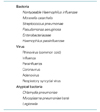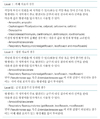Abstract
Chronic obstructive pulmonary disease (COPD) is the fourth leading cause of death in the United States, and is projected to rank fifth in 2020 as a worldwide burden of disease. It accounts for approximately 500,000 hospitalizations for exacerbations each year. According to a nationwide survey in Korea, the prevalence of COPD is 7.7%. New definitions of acute COPD exacerbation have been suggested, but the one used by Anthonisen is still widely accepted. It requires the presence of one or more of the following findings: increase in sputum purulence, increase in sputum volume, and worsening of dyspnea. The etiology of the exacerbations is mainly infectious. Patients experiencing COPD exacerbations with clinical signs of airway infection may benefit from antibiotic treatment. Antibiotic use has been shown to be beneficial, especially for patients with severe exacerbation. When initiating empirical antibiotic treatment physicians should always take account of any guidance issued by their local microbiologists. Antibiotic choices for patients with uncomplicated COPD include an advanced macrolide (azithromycin or clarithromycin), a ketolide (telithromycin), a cephalosporin (cefuroxime, cefpodoxime, or cefdinir) or doxycycline. In patients with complicated COPD, antibiotic choices include a new fluoroquinolone (moxifloxacin, gemifloxacin, gatfloxacin, or levofloxacin) or amoxicillin clavulanate. If Pseudomonas and other Enterobactereaces species are suspected, a combination therapy should be considered. When the initial empiric antimicrobial therapy fails, it would be appropriate to reevaluate the patient to confirm the diagnosis, to consider sputum studies to ascertain for resistant or difficult-to-treat pathogens, and to treat with an alternative agent with a better in vitro microbiologic efficacy.
References
1. American Thoracic Society, European Respiratory Society. Standards for the Diagnosis and Management of Patients with COPD: American Thoracic Society, European Respiratory Society. 2004. 166–172.
2. Soto FJ, Varkey B. Evidence-based approach to acute exacerbations of COPD. Curr Opin Pulm Med. 2003. 9:117–124.

3. National Heart, Lung, and Blood Institute. World Health Organization. Global Strategy for the Diagnosis, Management, and Prevention of Chronic Obstructive Pulmonary Disease Updated 2004: National Heart, Lung, and Blood Institute, World Health Organization. 4. 87–93.
4. British thoracic society. Management of exacerbations of COPD. Thorax. 2004. 59:131–156.




 PDF
PDF ePub
ePub Citation
Citation Print
Print






 XML Download
XML Download